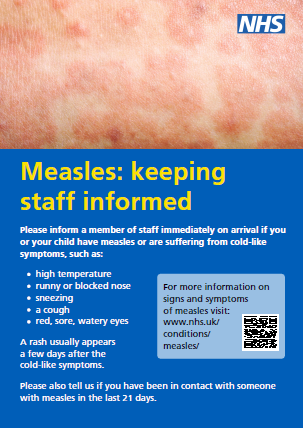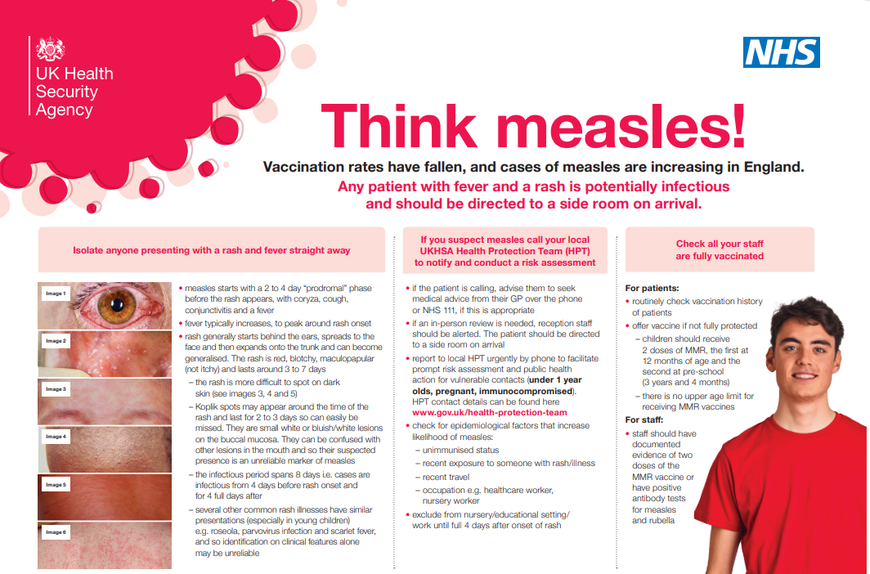Measles information: for healthcare professionals
The number of cases of Measles in young people has risen, and measles outbreaks have been reported in adjoining counties. Measles is an infection that spreads very easily and can cause serious problems in some people.
Initial symptoms include fever, conjunctivitis, cough, runny nose and sneezing. This may be followed by small grey/white spots, called Koplik’s spots, on the inside of the mouth 1 to 2 days before rash onset which may last for 2 to 4 days (although these are often confused with other lesions in the mouth and so their suspected presence is an unreliable marker of measles).
Measles rash appears brown or red and blotchy on white skin but may be harder to detect on black or brown skin. The rash develops 2 to 4 days after the onset of fever, and spreads from the head to the body over the next 3 to 4 days.
The best way to prevent measles is through vaccination.

Information for healthcare professionals
- Please isolate all patients with suspected and/or confirmed Measles. Any patient with a fever and a rash is potentially infectious and should be isolated and directed to a side room on arrival to a direct admission area
- Measles starts with a TWO to FOUR day ‘prodromal’ phase before the rash appears, with coryza, cough, conjunctivitis and a fever.
- If you suspect a patient has Measles, please send a green Virocult swab (containing fluid) of the throat to the laboratory for diagnosis. The HPT may in addition send an MMR oral fluid test kit
- Staff must wear FFP3 respirators or powered hoods for all contact with patients with suspected and/or confirmed Measles
- If the patient is calling, advise them to seek medical advice from their GP over the phone or NHS 111, if this is appropriate.
- If an in-person review is needed, reception staff should be alerted. The patient should be directed to a side room on arrival.
- Please contact the IPCT if you are concerned a patient has suspected and/or confirmed Measles. If this is out of hours contact the Consultant Microbiologist on call via switchboard
- If a patient has Measles they should be exclude from nursery, educational setting or work until full FOUR days after onset of rash. This is the same for staff who have Measles.
- Please check the vaccination status of patients
- Staff especially those working in ED, direct admission areas and in Paediatrics should be vaccinated or have positive antibody tests for measles and rubella. If you do not know your vaccination status please contact Working Well.
Infection control precautions
- Isolate the patient (ideally with an ensuite bathroom). Patients with suspected measles should not wait in communal areas/reception
- Healthcare worker PPE for assessment and management of suspected and confirmed cases of measles include:
- Gloves
- Apron (or gown if extensive splashing or spraying, or performing an aerosol generating procedure (AGP))
- FFP3 respirator or Powered hood
- Eye protection
- If tolerated the patient should wear a type IIR surgical mask when outside of the isolation room e.g. during transfer
- Inform the Infection Prevention and Control team or Consultant Microbiologist on call of all suspected cases
- The IPCT will support contact tracing if required for patients who have been exposed to Measles. Face to face contact of any length or more than 15 minutes in a small, confined area, where correct PPE is not worn is considered as an exposure and will require follow up.
MMR vaccination
Many of those working in clinical practice have never seen a case, whilst most people will have mild disease, it can cause meningitis, pneumonia, blindness, seizures and pregnancy loss. We need to take action together and we need to do that now.
We have seen significant increases in Measles cases across both Birmingham and Coventry, much too close for comfort. Maximising MMR vaccination is important for your protection, the protection of our patients and to reduce the number of Measles cases and stop further transmission.
We are therefore asking all patient-facing staff to get their MMR vaccination.
Q) What evidence do I need to prove I am protected against Measles?
Satisfactory evidence of protection would include documentation of:
- having received two doses of MMR,
and/or - positive antibody tests for measles
Q) Where can I find my vaccination history?
If you are unsure of your vaccination history you may be able to obtain your vaccination information from the following sources:
- NHS App
- Working Well Telephone: 01452 894480
Email: workingwell@ghc.nhs.uk - If you are below the age of 20yrs, you can contact the ‘Child Health Information Services’ for the area that you grew up in. For Gloucestershire and local surrounding areas the contact details are 0300 5611853. Child Health Information Services | Local Government Association
Q) What if your vaccination history is unknown or incomplete?
If your vaccination history is unknown or incomplete, you will need to get the MMR vaccine.
- Colleagues who have not received the MMR should receive two doses at least one month apart.
- If you have already received one dose of MMR, you should receive a second dose to ensure you are fully protected
Q) How can I get the MMR?
Working Well are offering MMR vaccination clinics Monday to Friday 9am-3pm for clinical staff with patient-facing roles. An appointment can be arranged by contacting Working Well on Telephone: 01452 894480 Email: workingwell@ghc.nhs.uk
I have been sent a text message or email from the IPC team - next steps
Defining a Measles exposure
Face to face contact of any length or more than 15 minutes in a small, confined area, where correct PPE is not worn is considered as a significant exposure to Measles.
Do you have any of these Measles signs and symptoms?
- Fever
- Rash (Measles rash appears brown or red and blotchy on white skin but may be harder to detect on black or brown skin).
- Conjunctivitis
- Cough
- Runny nose and sneezing
- Small grey/white spots, called Koplik’s spots, on the inside of the mouth
If you have symptoms of Measles, please follow these steps:
- You must not attend work until a full FOUR days after onset of rash. Day of rash onset is day 0. You must isolate at home.
- Contact your line manager; who should then contact the Infection Prevention and control team (GRH ext 6122 and CGH ext 3129)
- Inform Working Well on telephone: 01452 894480
If you have no symptoms of Measles, please follow the steps below:
- Check whether you can prove you are protected against Measles
Satisfactory evidence of protection includes documentation of:
- having received two doses of MMR, and/or
- positive antibody tests for Measles
If you are unsure of your vaccination history, you may be able to obtain your vaccination information from the following sources:
- NHS App
- Working Well Telephone: 01452 894480 Email: workingwell@ghc.nhs.uk
- If you are below the age of 20yrs, you can contact the ‘Child Health Information Services’ for the area that you grew up in. For Gloucestershire and local surrounding areas the contact details are 0300 5611853. Child Health Information Services | Local Government Association
I have satisfactory evidence of protection against Measles
If you have satisfactory evidence of protection, you can:
- Continue to work normally.
- You should report to Working Well if you develop symptoms or a fever between day 7 and 21 days after the last exposure.
- If you develop a fever or rash you will need to stay off from all work until 4 full days after onset of the rash.
- If you are immunosuppressed, as defined in chapter 6 of Immunisation against Infectious Disease in the Green book, you should report to Working Well for assessment.
I do not have satisfactory evidence of protection against Measles
- Contact Working Well immediately for Measles IgG testing. You will be able to continue to work if you are found to be measles IgG positive within 7 days of exposure.
- Working Well will assess you for MMR vaccine. Where MMR vaccine is given post-exposure and you remain symptom-free for at least 14 days after MMR was given, you can return to work at that stage.
- If your measles IgG blood test is negative or your blood test was not completed within 5 days of exposure, you will need to be excluded from work and self-isolate at home from the 5th day after the first exposure to 21 days after the final exposure.
- If you are asked to self-isolate this is not recorded as sickness by your line-manager and will not affect your sickness record or pay.
